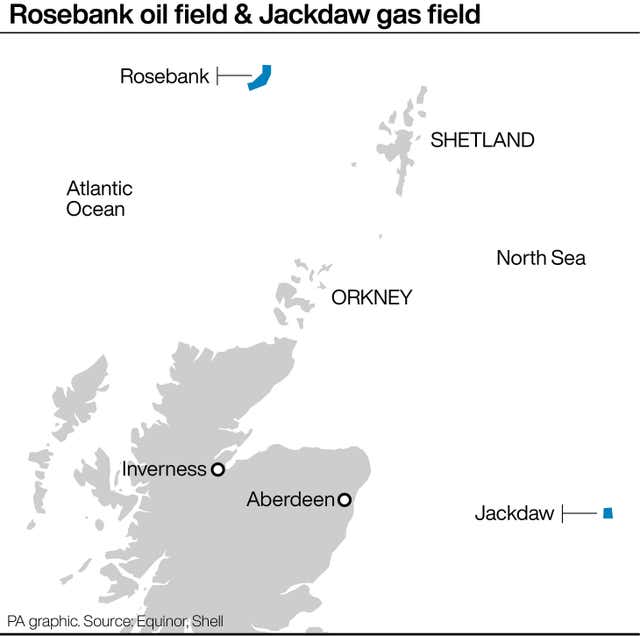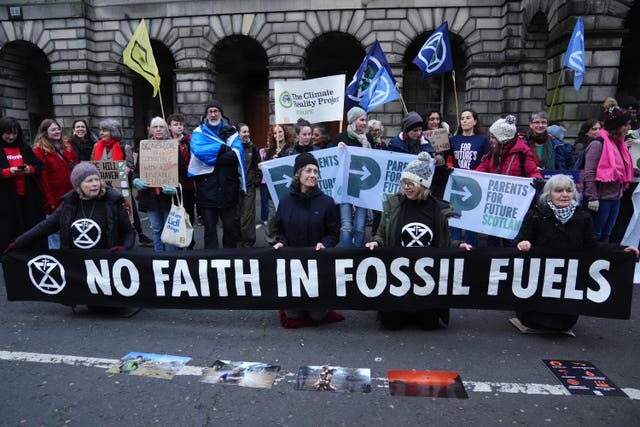An environmental group has told a court a “substantive error of law” was made when consent was granted for new oil and gas fields in Scottish waters.
Greenpeace and Uplift have jointly raised a legal challenge at the Court of Session in Edinburgh over decisions to approve the new developments.
They argue consent for the Rosebank oil field north-west of Shetland and the Jackdaw gas field off Aberdeen ought to be paused and reassessed.
The former Conservative-led UK government approved Shell’s proposals to develop the Jackdaw field in 2022 and cleared Equinor and Ithaca Energy’s plans to drill in the Rosebank field last September.
The two environmental groups argue the UK Government, along with the North Sea Transition Authority (NSTA), failed to consider the full impact of emissions caused by burning oil and gas from the fields.

They also argue their reasons for approving the schemes were not transparent and the development will disrupt a marine protected area.
Ruth Crawford KC, representing Greenpeace UK, told the court on the first day of the four-day hearing on Tuesday a “substantive error of law” had been made when consent was granted for the two schemes based on limited information on their environmental impact, and that the charity was seeking “remedy”.
“It was not simply a matter of discretion on whether or not to take emissions into account, it is a matter of the law the impact of emissions had to be taken into account,” she said.

Ms Crawford argued for both developments to be paused and for the oil companies involved in the projects to be made to submit revised environmental impact assessments.
She said these assessments should include consideration of so-called Scope 3 emissions which would be produced by burning all the oil and gas to be extracted from the fields.
Shell said Jackdaw is a “vital project for UK energy security” and will provide enough fuel to heat 1.4 million UK homes.
A spokesperson for the firm said following Tuesday’s hearing: “From the outset, Jackdaw has been developed in line with all relevant consents and permits.”
He added: “Stopping the work is a highly complex process, with significant technical and operational issues now that infrastructure is in place and drilling has started in the North Sea.”
Equinor has similarly said Rosebank is “vital for the UK” in terms of local investment, jobs and energy security.
The case, before Lord Ericht, continues.




Why are you making commenting on The National only available to subscribers?
We know there are thousands of National readers who want to debate, argue and go back and forth in the comments section of our stories. We’ve got the most informed readers in Scotland, asking each other the big questions about the future of our country.
Unfortunately, though, these important debates are being spoiled by a vocal minority of trolls who aren’t really interested in the issues, try to derail the conversations, register under fake names, and post vile abuse.
So that’s why we’ve decided to make the ability to comment only available to our paying subscribers. That way, all the trolls who post abuse on our website will have to pay if they want to join the debate – and risk a permanent ban from the account that they subscribe with.
The conversation will go back to what it should be about – people who care passionately about the issues, but disagree constructively on what we should do about them. Let’s get that debate started!
Callum Baird, Editor of The National
Comments: Our rules
We want our comments to be a lively and valuable part of our community - a place where readers can debate and engage with the most important local issues. The ability to comment on our stories is a privilege, not a right, however, and that privilege may be withdrawn if it is abused or misused.
Please report any comments that break our rules.
Read the rules hereComments are closed on this article